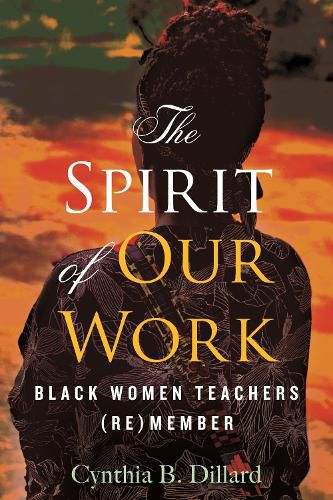Readings Newsletter
Become a Readings Member to make your shopping experience even easier.
Sign in or sign up for free!
You’re not far away from qualifying for FREE standard shipping within Australia
You’ve qualified for FREE standard shipping within Australia
The cart is loading…






An exploration of how engaging identity and cultural heritage can transform teaching and learning for Black women educators in the name of justice and freedom in the classroom
In The Spirit of Our Work, Dr. Cynthia Dillard centers the spiritual lives of Black women educators and their students, arguing that spirituality has guided Black people throughout the diaspora. She demonstrates how Black women teachers and teacher educators can heal, resist, and (re)member their identities in ways that are empowering for them and their students. Dillard emphasizes that any discussion of Black teachers’ lives and work cannot be limited to truncated identities as enslaved persons in the Americas.
The Spirit of Our Work addresses questions that remain largely invisible in what is known about teaching and teacher education. According to Dillard, this invisibility renders the powerful approaches to Black education that are imbodied and marshaled by Black women teachers unknown and largely unavailable to inform policy, practice, and theory in education. The Spirit of Our Work highlights how the intersectional identities of Black women teachers matter in teaching and learning and how educational settings might more carefully and conscientiously curate structures of support that pay explicit and necessary attention to spirituality as a crucial consideration.
$9.00 standard shipping within Australia
FREE standard shipping within Australia for orders over $100.00
Express & International shipping calculated at checkout
An exploration of how engaging identity and cultural heritage can transform teaching and learning for Black women educators in the name of justice and freedom in the classroom
In The Spirit of Our Work, Dr. Cynthia Dillard centers the spiritual lives of Black women educators and their students, arguing that spirituality has guided Black people throughout the diaspora. She demonstrates how Black women teachers and teacher educators can heal, resist, and (re)member their identities in ways that are empowering for them and their students. Dillard emphasizes that any discussion of Black teachers’ lives and work cannot be limited to truncated identities as enslaved persons in the Americas.
The Spirit of Our Work addresses questions that remain largely invisible in what is known about teaching and teacher education. According to Dillard, this invisibility renders the powerful approaches to Black education that are imbodied and marshaled by Black women teachers unknown and largely unavailable to inform policy, practice, and theory in education. The Spirit of Our Work highlights how the intersectional identities of Black women teachers matter in teaching and learning and how educational settings might more carefully and conscientiously curate structures of support that pay explicit and necessary attention to spirituality as a crucial consideration.